Graham Reid | | 13 min read
Saratoga Summer Song: Teddy Thompson
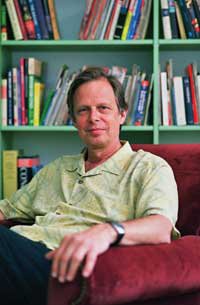
In 2005 Joe Boyd published his memoir, White Bicycles, of what he did in the Sixties. At the end he wrote; “I cheated. I never got too stoned. I became the eminence gris I aspired to be, and disproved at least one Sixties myth: I was there and I do remember”.
Where he was and what he remembered was extraordinary.
As an educated son of the American university system, he fell for blues and jazz, tracked down the likes of Lonnie Johnson and had him play concerts, started a career as a small time promoter taking Muddy Waters to Britain, became a record producer, moved back and forth between New York and London, was the stage manager when Bob Dylan went electric at the Newport Folk Festival in '65 . . .
In England he produced the young Eric Clapton, the first Pink Floyd single Arnold Layne, recorded singular people like Nick Drake, Fairport Convention, the Incredible String Band and many others who brought British folk and rock together, started the famous UFO club in London where the psychedelic underground made its home base . . .
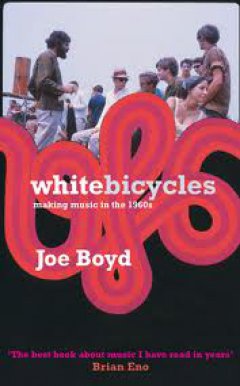 All that and so much more – and that
was just the Sixties, he subsequently did an albm with Nico, recorded Fables of the
Reconstruction for REM and many other albums – which he recalled in
White Bicycles with understatement, clarity and sometimes dry humour
(the silent breakfast with a young Bob Dylan is very funny).
All that and so much more – and that
was just the Sixties, he subsequently did an albm with Nico, recorded Fables of the
Reconstruction for REM and many other albums – which he recalled in
White Bicycles with understatement, clarity and sometimes dry humour
(the silent breakfast with a young Bob Dylan is very funny).
He also founded a couple of innovative record companies (Witchseason and Hannibal), did a Jimi Hendrix bio-pic (Hendrix), worked on soundtracks (A Clockwork Orange, Deliverance which sprung the hit Duelling Banjos which he produced), was an early enthusiast for what became world music and . . .
Boyd, now 70, currently has his name as producer on a double CD, Sing Me the Songs; Celebrating the Works of Kate McGarrigle, a tribute to the singer-songwriter who died in January 2010 and whom he had recorded (with sister Anna) as The McGarrigle Sisters.
Drawn from three live tribute concerts – with Kate's children Rufus and Martha Wainwright, Norah Jones, Emmylou Harris also in the cast – the album reminds just how diverse the work of Kate McGarrigle was.
Just as his previous tribute concerts/album Way to Blue was with the music of Nick Drake.
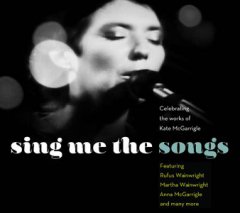 “I felt that,” he says from
London, “when we got that group of singers for that first concert
in London. As hugely committed to Kate's music and as an artist as I
always have been, even I was pretty stunned by the quality of the
songs over two and half hours and having all these different types of
singers singing in a different way.
“I felt that,” he says from
London, “when we got that group of singers for that first concert
in London. As hugely committed to Kate's music and as an artist as I
always have been, even I was pretty stunned by the quality of the
songs over two and half hours and having all these different types of
singers singing in a different way.
“I think a lot of people have been stunned that both Kate and Nick Drake records are full of singers who sound nothing like Kate or Nick and are singing the songs in very much their own personal way, and that shows the strength of a songwriter.”
Other than this project, you are in semi-retirement as a gentleman of leisure at the moment?
[Laughs] I wrote White Bicycles which has done pretty well and I am writing another, this one about the phenomenon of the western bourgeoise fascination with musical exotica, otherwise known as world music.
Excellent, because you were very early on into what we know as world music when you recorded people like Toumani Diabate and people like that.
Yeah I was. This is a much more difficult book than White Bicycles because I am actually doing research and writing about things I didn't witness.
I liked what you said at the end of White Bicycles that you were there and you do remember. You seem living proof of the adage, 'I f you you can keep your head while all those about you are losing theirs . . .' You did.
I don't know about that [laughs] but it became a cliché that if you remember the Sixties you weren't there. So I wanted to say I was there.
You were there at pivotal points and I'd like to talk about that, but one thing jumped out at me in White Bicycles was when you mentioned Buena Vista Social Club and people going into a place where that album was playing. They would look around for the band. That idea of that record being produced in such a way as to sound live. So I'd like to talk to you about production. When you listen to studio-created music today, would it be fair to say many producers don't understand, or even need to understand, things like microphone placement in the same way as you grew up having to do.
It's a very different approach today. Most artists, if you offer them the poisoned chalice of perfection – where they can create a track with no flaws and it can be the way they imagined it in their head when they wrote it – they would probably take it. Artists now are much more in control of the process, at least in rock bands and singer-songwriters. So if someone says, 'If you don't like the bass player we can put another bass part on' or 'If you don't like that guitarist we can get bring in another guitar and re-do it' . . . well, everything becomes . . . With the click track and the sequencers and whatever digital equipment you've got – the possibility to project perfection and is always beckoning.
When I hear things like that I think it's an interesting song and a nice voice but I'll never listen to that again because it just doesn't feel alive, or feel the way music at its optimum would feel to me.
What I like is when you can imagine, even if it's a false imagination, a bunch of people sitting around in a room playing and not knowing exactly what is going to come next.
When I look at who you recorded, many of whom were great people but didn't get their due at the time, and it seems to me they all had an identifiable musical personality. I refer to the Nick Drakes of this world. Today people seem to aim to be in the genre and if you can get that, then you are home free.
Yes. There are plenty of strong personalities in the music business today and there are some good records being made, but I do think the production technology is a temptation to try to get everything really clean and neat and just so. That ends up shooting itself in the foot.
We'll talk about the new McGarrigle tribute in a minute, but I know you were there to produce that first Pink Floyd single with Syd Barrett in the band [Arnold Layne] and then they went elsewhere. Did you at the time look back and think, 'That one got away on me'. But could you or would you have produced them in the same way that subsequently happened? Or was that a journey you might never have wanted to take?
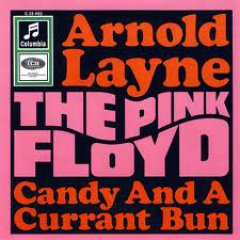 The Piper at the Gates of Dawn [album,
produced Norman Smith in Abbey Road] was what we were working on and
that's a pretty good record, but I think in an ideal world I would
have produced them at Sound Techniques with John Wood as the
engineer, and I think they sensed the difference because they went
back to Sound Techniques and hired John to record [their second
single] See Emily Play because they wanted to get that sound, more of
that.
The Piper at the Gates of Dawn [album,
produced Norman Smith in Abbey Road] was what we were working on and
that's a pretty good record, but I think in an ideal world I would
have produced them at Sound Techniques with John Wood as the
engineer, and I think they sensed the difference because they went
back to Sound Techniques and hired John to record [their second
single] See Emily Play because they wanted to get that sound, more of
that.
I think [Piper] a good record and Bike is one of the best tracks they ever recorded, but I do think there's a slightly less vivid sound on that record than on the singles, and certainly on Arnold Layne. But I dunno, who knows how much was what they really wanted?
It's impossible to speculate, but after Syd left the music changed a lot and definitely Syd's songs were the hook for me into the group. David Gilmour is a great musician and I like what the group became – although it astonished me how successful they became without Syd – so I have nothing but admiration for that. But it was a different sort of thing to what originally drew me in.
Let's talk about Sing Me The Songs and Kate McGarrigle. You haven't done a lot of production in recent years, were you their first call because of the long association you'd had with them and various people on the album?
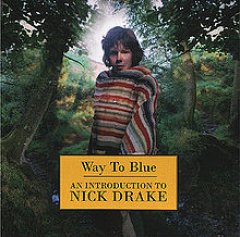 There's a couple of things to say about
that. You've not been sent the Way to Blue Nick Drake tribute?
There's a couple of things to say about
that. You've not been sent the Way to Blue Nick Drake tribute?
I know it, but don't have a copy.
Oh, I'm depressed. Let me get you one. Because I had produced that record right before this Kate McGarrigle one. I'll have words with my antipodean distributor.
The McGarrigle tribute?
That album came about, not because they wanted me to produce the record, but it started very much like the Nick Drake project which was with a concert. In a way this whole cycle of work I've done started with a Syd Barrett tribute. After he died the Barbican asked me to curate a concert so I helped put together this memorial which turned out to be a wonderful evening.
I probably would have resisted the idea because I was putting time into tributes to Nick Drake, but the Barrett thing was so much fun, and it was rewarding to hear different types of singers performing music by this one particular artist's work.
So when someone then said, 'Do you want to do a Nick Drake concert at the Birmingham Town Hall?' I said sure. So that began and then I did one with Richard Thompson, a reunion of Fairport Convention with different singers coming in to do [the late] Sandy Denny's parts at the Barbican. And I did a celebration of the Incredible String Band at the Barbican too.
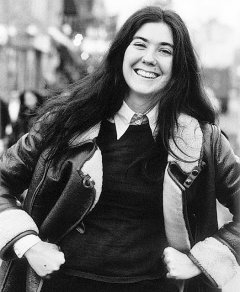 The following summer when
Richard Thompson was asked to be the curator of the Meltdown Festival
one of the first things he suggested they do – because Kate
McGarrigle [right] had died just a few months before – was he called and
asked if I wanted to put on a celebration of Kate. And I said. 'Let
me ask Rufus and Martha if the are up for it' because I wouldn't want
to do it without them, and they said sure.
The following summer when
Richard Thompson was asked to be the curator of the Meltdown Festival
one of the first things he suggested they do – because Kate
McGarrigle [right] had died just a few months before – was he called and
asked if I wanted to put on a celebration of Kate. And I said. 'Let
me ask Rufus and Martha if the are up for it' because I wouldn't want
to do it without them, and they said sure.
So we did it in London three years ago and they loved it so much they said 'Let's do it in New York', so we did it there the following year, and the year after that we did it in Toronto as part of a festival. So it started out just as a concert production, which in a way is the closest I get these days to making records the way I used to.
Then because we decided, 'What the heck, let's just run a set of ProTools across everything on the mixing board' we recorded all the concerts, and once you record them I said 'Let's mix them' and everyone thought they were pretty good so it was, 'Let's put out a record'.
That's the process. It wasn't that the family hired me as a producer.
You have the advantage that these people can actually sing and can pull it off live. We aren't taking about untried Idol singer talent, and there are some beautiful tracks here. I especially like Teddy Thompson's Saratoga Summer Song which I saw him sing in concert in New Zealand when he toured with Rufus.
I'm particularly proud of that track because obviously we wanted him involved because he's Richard's son and a friend of Rufus and Martha, and a wonderful singer. But his style of singing is . . .
First it wasn't immediately clear what he was going to sing and I discovered that song on a demo tape that I had on cassette stuck in the back of a closet. I must have heard the song back in '76 or whenever but it's shocking to me that I didn't frogmarch Kate into the studio to record it, because it is such a beautiful song. But when I heard it I thought 'That's for Teddy'. And he's been singing it ever since.
It seems to be me Kate and Anna McGarrigle were enormously respected but, like Richard Thompson, Loudon Wainwright and so on, they remain on the fringe of being huge. I'd like them to be bigger than they are. You've worked with a lot of people like that.
Yeah [laughs], tell me about it. That's why I can't retire.
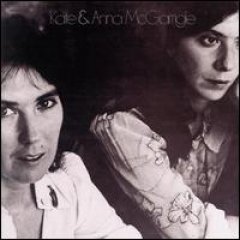 Nick Drake is bigger now than he ever
was and the Vashti Bunyan album Just Another Day which you recorded
in 1970 has only just came out in reissue in 2000. From where you
sit, what is it that prevents these people from being bigger? Is it
just something in the nature of the business that is going to
constantly deny these people their due?
Nick Drake is bigger now than he ever
was and the Vashti Bunyan album Just Another Day which you recorded
in 1970 has only just came out in reissue in 2000. From where you
sit, what is it that prevents these people from being bigger? Is it
just something in the nature of the business that is going to
constantly deny these people their due?
It must be the producer's fault. [laughs] There are two extremes: you could say I didn't produce it commercially enough or you could say that the listening public is a bit slow on the uptake. But also to be fair, to look at in an objective way, when the first McGarrigle record came out, I and everybody at Warner Brothers were so excited because we thought we had a great record. Everyone loved that record, it's an iconic record that a lot of people revere.
But first of all they chose – between them and the art department – a down-in-the-moth not very jazzy record cover [above]. Then Kate got pregnant with Martha. The big tour was planned and the record came out, but Kate was six months pregnant or something and didn't want to go on the road. So the tour was cancelled and this wonderful record went out into the marketplace with not a lot of backing.
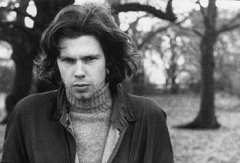 Subsequently Kate and Anna toured
sporadically and somewhat erratically over the next four or five
years and they did actually better in Britain than they did in the
States, but still it didn't set any sales records.
Subsequently Kate and Anna toured
sporadically and somewhat erratically over the next four or five
years and they did actually better in Britain than they did in the
States, but still it didn't set any sales records.
Nick Drake [right] , as you know, barely performed at all because he was so shy and remote. It was very hard for people to connect with him.
And Vashti Bunyan was so shy she went off to the Scottish Highlands and lived in a horse trailer, so she wasn't exactly working the circuit to promote the record.
So for all those artists in some way you could say the lack of sales and lack of impact was the lack of a real touring ethos and building up an audience, which was the way you were supposed to do it in those days.
You could sure pick 'em then.
Oh yeah [laughs]
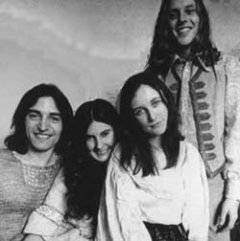 The Incredible String Band were one of
my favourite bands of that era.
The Incredible String Band were one of
my favourite bands of that era.
Yeah, and they on the other hand were the flipside of al this because they were terrific performers and they toured a lot, all over the world, and America in the late Sixties. They got to be really successful, even more successful than you might guess by listening to their records which seem weird and hippie-ish and not exactly easy to get into these days.
But they played Fillmore East four times in a year in '69 and the Royal Albert Hall where they played a couple of times. They got on the charts and sold lots of records . . . but now they are a very minority taste.
You also worked with some very big people too though. You got REM at a very pivotal period in their career. Was that a good experience for you?
It was a mixed experience. I enjoyed working with them, they are very nice guys and very smart, and they were fun. The process was a little frustrating and we weren't always on the same page, particularly in the mixing, so I ended up turning the record in.
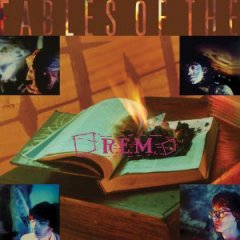 I wanted to get back into the mixing but the
management said they'd spent enough money. So I was actually quite
anxious when it came out that I was going to be pilloried for having
taken a perfectly good up-and-coming group and sending them back down.
I wanted to get back into the mixing but the
management said they'd spent enough money. So I was actually quite
anxious when it came out that I was going to be pilloried for having
taken a perfectly good up-and-coming group and sending them back down.
I was hugely relieved that it sold more than the first and second albums, but then of course the next album came along and sold about 10 times what Fables did.
So mine was a transitional album and we're still all friends and we get along well and they were disappointed in the record and some fans were too. But in recent years the group and a lot of websites have come around and said that is a great record. It just took a while.
When I look over your long career, you started off with a passion for blues and jazz, but blues and jazz albums are almost conspicuously absent in your long discography, I know you did Chris McGregor and Brotherhood of Breath – and Defunkt's Thermonuclear Sweat which is fantastic – but you didn't ever record a lot of jazz and blues artists. Why was that?
I don't know really. It was a combination of things. When I started producing records the real authetic blues scene was sort of over. Not only the Chicago blues scene but all the great Muddy Waters and Howlin' Wolf records been made by that time, the circumstances were not the same in the sense there wasn't a community out of which that came anymore.
I was never exactly a fan of white blues and I ended up in England. I did the Geoff and Maria Muldaur record and produced a Jimi Hendrix film, and on Hannibal we put out Muleskinner, I mixed some it but was basically all done when I picked it up. In New Orleans I did a record with a pick-up group called Yockamo All Stars [in 1998] but neither of those set any sales records. So in a way the funkiest record I ever made was Reggae Got Soul.
Yes, the Toots and the Maytals album. Is there anybody you regret that you didn't get around to recording, someone who slipped past you? I know you were impressed by some Swedish musicians and a couple of years later they became ABBA.
Sure, there are lots of people. The list of the ones that got away is quite long. At one point when I thought I was a film producer I was on my way back to London because I had this film distribution company. I think it was around then, anyway I was in a hurry to get back. John Hammond called and said 'Can't you stick around till Tuesday night, there's this artist at the Bottom Line. He's made a couple of records for CBS but he hasn't done anything yet, but we think he can and you might be right producer.'
Of course that was Bruce Springsteen . . . and I didn't stay. I flew back to London.
You have to say Jon Landau did a great thing with [Springsteen's next album] Born to Run so it was probably lucky for Bruce I didn't do him.
You might have recast him as a folk singer, which ironically is what he has become these day.
[laughs] Right.

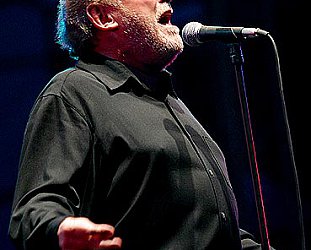
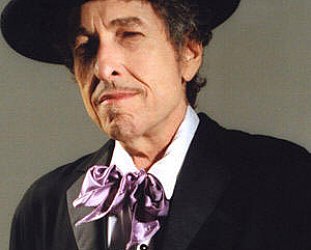
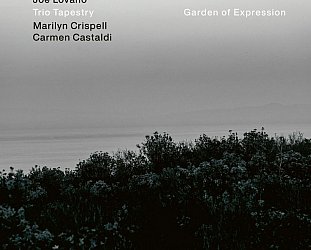
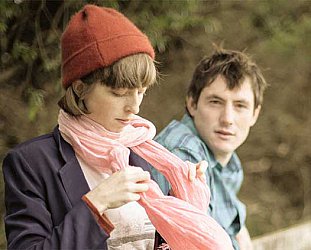
post a comment